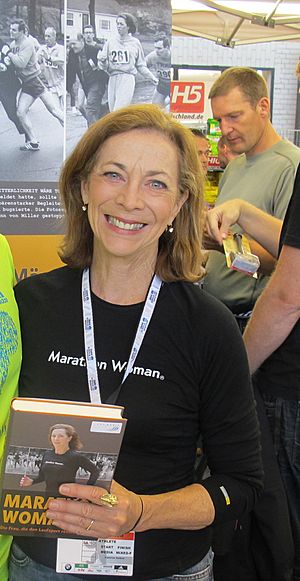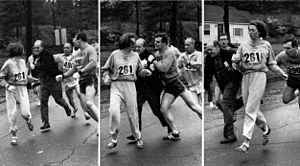Kathrine Switzer facts for kids

Switzer at the 2011 Berlin Marathon expo
|
|
| Personal information | |
|---|---|
| Born | January 5, 1947 Amberg, Germany |
| Education | George C. Marshall High School |
| Alma mater | Syracuse University |
| Occupation | Runner, author |
| Spouse(s) |
Tom Miller
(m. 1968; div. 1973)Philip Schaub
(divorced)Roger Robinson
(m. 1987) |
Kathrine Virginia Switzer (born January 5, 1947) is an American marathon runner and writer. She also worked as a television commentator.
In 1967, she made history. She became the first woman to officially run the Boston Marathon. During her race, a race official named Jock Semple tried to stop her. He grabbed her race number to remove her from the competition. Kathrine's boyfriend, Thomas Miller, pushed Semple away. This allowed Kathrine to finish the race.
Because of her run, the AAU made a rule. They banned women from racing against men. It took until 1972 for the Boston Marathon to have an official race just for women.
Contents
Kathrine Switzer's Early Life and Running Journey
Growing Up and School
Kathrine Switzer was born in Amberg, Germany, in 1947. Her father was in the United States Army. Her family moved back to the U.S. in 1949. She went to George C. Marshall High School in Virginia. Later, she studied at Syracuse University. She earned her bachelor's degree in 1968 and her master's degree in 1972.
Training for the Marathon
When Kathrine was at Syracuse University, she wanted to train with the men's cross-country team. Her coach, Arnie Briggs, agreed to train with her. He thought a marathon was too long for a woman. But he said if she could run the distance in practice, he would take her to Boston. By early 1967, Kathrine was training hard for the Boston Marathon. She ran long distances, sometimes 20 miles.
Making History at the 1967 Boston Marathon
The Rules and Other Runners
The rules for the Boston Marathon did not say anything about gender. However, the AAU, which oversaw the race, said women could not compete in races longer than a mile and a half.
Other women had tried to run the marathon before. In 1966, Bobbi Gibb ran the race without officially entering. She finished ahead of many male runners. But she was not an official participant.
Kathrine Switzer decided she would be an official runner. She signed up using her initials, 'K.V. Switzer'. She paid the fee and got her race number, 261. She later said she always signed her name that way. Her father supported her decision to run. On race day, other runners were friendly and welcoming. She ran with her coach, Arnie Briggs, and her boyfriend, Tom Miller.
The Famous Incident
A few miles into the race, it became clear that a woman was officially running. This was a big surprise to many.
The race co-director, Jock Semple, saw her. He was known for being very traditional about the marathon. He thought women should not be running. Semple jumped from a press truck and ran towards Kathrine. He tried to rip off her race number.
Kathrine later wrote about this moment. She said she saw "the most vicious face" she had ever seen. Semple grabbed her shoulder and yelled, "Get the hell out of my race and give me those numbers!"
Semple's attack knocked off one of Kathrine's gloves. But her race number stayed on. Her coach, Arnie Briggs, tried to protect her. Semple knocked him to the ground. Then, Kathrine's boyfriend, Tom Miller, stepped in. He used his shoulder to push Semple, making him fall.
Kathrine finished the marathon in about 4 hours and 20 minutes. Photos of Semple's attack spread around the world. This event became a symbol for women's rights in sports. Bobbi Gibb also ran the 1967 race, finishing faster than Kathrine. But Gibb was not an official entrant and was not challenged.
After the Race
After Kathrine finished, the Boston Athletic Association director, Will Cloney, spoke out. He said women could not run in the marathon because of the rules. He believed that without rules, society would be "in chaos."
The AAU changed its rules after Kathrine's run. They banned women from all races with men. If a woman broke this rule, she could not compete in any race. Kathrine and other female runners worked hard to change this. Finally, in 1972, the Boston Marathon created an official race for women.
Kathrine knew how important it was to finish. She said if she quit, people would think women could not run marathons. She felt that quitting would set women's sports back. She realized her fear turned into anger, which pushed her to finish.
Later in life, Kathrine and Jock Semple became friends. She understood he was just trying to protect the race. She even thanked him for attacking her. She said it gave her the idea to create more running chances for women. She believes it also gave the world a powerful photo for the women's rights movement.
Kathrine Switzer's Achievements and Legacy
Later Races and Work
Kathrine continued her running career. She won the New York City Marathon in 1974. Her best marathon time was 2 hours, 51 minutes, and 37 seconds in the 1975 Boston Marathon.
Runner's World Magazine named her the Female Runner of the Decade from 1967 to 1977. She also became a television commentator for marathons. She even won an Emmy Award for her work. In 1979, she was featured on a Supersisters trading card.
Kathrine has written books about running. Her memoir, Marathon Woman, came out in 2007. It won an award for its portrayal of women in sports.
Empowering Women Through Running
Kathrine Switzer is happy to see many women running today. She says women often cry with joy when they meet her. They tell her that running has changed their lives. They feel like they can do anything.
In 2011, she was inducted into the National Women's Hall of Fame. This was for starting a social revolution. She helped empower women around the world through running. She has worked since 1967 to create more running opportunities for women.
In 2015, Kathrine started a non-profit group called 261 Fearless. This group uses running to help women overcome challenges. It helps them live healthier lives.
Returning to Boston
In 2017, Kathrine ran the Boston Marathon again. It was her ninth time running the race. It was also 50 years after her first historic run. She wore bib number 261, the same number she had in 1967. She finished the race in 4 hours, 44 minutes, and 31 seconds. She led a team of runners from 261 Fearless. In 1967, she was the only official woman. In 2017, over 13,700 women ran, almost half of all the runners. That same year, the Boston Athletic Association decided to retire bib number 261. This was to honor Kathrine Switzer.
She also ran the New York City Marathon in 2017. She finished in 4 hours, 48 minutes, and 21 seconds. In 2018, she gave a speech at Syracuse University. She also received an honorary degree.
Personal Life
Kathrine Switzer married Tom Miller in 1968. He was the man who helped her during the 1967 marathon. They divorced in 1973. She later married and divorced Philip Schaub. In 1987, she married Roger Robinson, a runner and writer from New Zealand.
Kathrine and Jock Semple became good friends later in life. He changed his mind about women in sports. She visited him shortly before he passed away in 1988.
Achievements
| Year | Competition | Venue | Position | Notes |
|---|---|---|---|---|
| Representing the |
||||
| 1974 | New York City Marathon | New York, United States | 1st | 3:07:29 |
| 1975 | Boston Marathon | Boston, Massachusetts, United States | 2nd | 2:51:37 |
See also
 In Spanish: Kathrine Switzer para niños
In Spanish: Kathrine Switzer para niños
- Marie-Louise Ledru
- Violet Piercy


